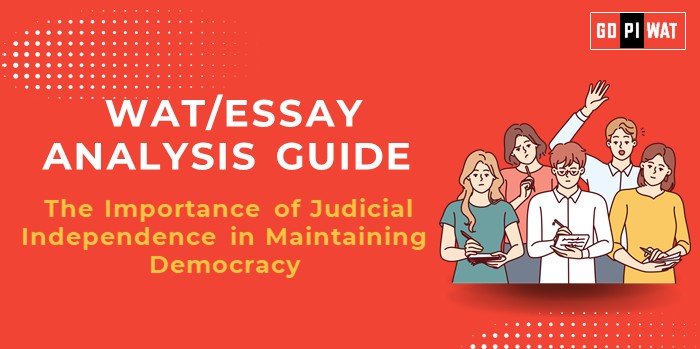📋 Group Discussion (GD) Analysis Guide: The Importance of Judicial Independence in Maintaining Democracy
🌐 Introduction to Judicial Independence
⚖️ Contextual Importance
Judicial independence is the cornerstone of a democratic society, ensuring that courts operate free from external pressures, whether political, economic, or societal. This separation of powers is crucial for upholding the rule of law and maintaining citizens’ trust in legal institutions.
📖 Topic Background
Judicial independence has evolved alongside democracy, dating back to the Magna Carta of 1215, which established early principles of checks and balances. Today, its relevance spans constitutional democracies like India and the U.S., where courts act as guardians against authoritarian overreach.
📊 Quick Facts and Key Statistics
- 🌍 Global Judicial Index (2023): Ranked 60th in independence globally (World Economic Forum).
- ⚖️ Backlog of Cases in India (2024): 50 million cases pending in courts, underscoring the judiciary’s workload.
- 🏛️ Judicial Vacancy: High courts in India face a 30% vacancy rate, impacting timely justice.
- 📜 Landmark Judgment: Kesavananda Bharati case (1973) established the Basic Structure Doctrine, fortifying judicial independence.
🔑 Stakeholders and Their Roles
- Government: Facilitates judicial appointments and budgets while respecting judicial autonomy.
- Judiciary: Adjudicates impartially on constitutional matters and disputes.
- Civil Society: Advocates for transparency and reforms in judicial processes.
- Media: Plays a watchdog role in exposing interference or corruption in judicial proceedings.
🏆 Achievements and Challenges
✅ Achievements
- 📜 Judicial Activism: Landmark judgments on environmental conservation and social justice issues.
- 🛡️ Basic Structure Doctrine: A safeguard against unconstitutional amendments.
- 💻 Digital Courts Initiative: Reduced procedural delays through e-filing and virtual hearings.
⚠️ Challenges
- 🔗 Political Interference: Criticism over appointments and judgments perceived as politically influenced.
- 🏢 Infrastructure Deficit: Courtrooms and technology inadequacies hinder efficiency.
- 🌎 Global Comparisons: Nations like the U.K. exhibit higher perceived independence due to robust funding and transparency practices.
📚 Case Study
The NJAC (National Judicial Appointments Commission) debate in India highlights tensions between judicial independence and accountability.
💬 Structured Arguments for Discussion
- Supporting Stance: “Judicial independence is essential for protecting minority rights against majoritarianism in democracies.”
- Opposing Stance: “Unchecked judicial independence can lead to judicial overreach, undermining legislative intent.”
- Balanced Perspective: “While judicial independence safeguards democracy, it must coexist with accountability mechanisms to ensure balanced governance.”
📖 Effective Discussion Approaches
- Historical Lens: “The judiciary’s role in democracy dates back to the Magna Carta, which first codified the principle of independent adjudication.”
- Data-Driven: “With over 50 million pending cases, the Indian judiciary faces significant challenges that question its independence and efficacy.”
Counter-Argument Handling:
“While some argue judicial overreach undermines democracy, it often acts as a corrective mechanism in failing legislative or executive actions.”
🔍 Strategic Analysis of Strengths and Weaknesses
- Strengths: Strong constitutional mandate, active judicial review, landmark judgments.
- Weaknesses: Delays, resource deficits, perceived bias in sensitive cases.
- Opportunities: Expanding digital infrastructure, enhanced transparency through judicial reforms.
- Threats: Increasing politicization, public mistrust.
🌟 Connecting with B-School Applications
- Real-World Applications: Legal audits in corporate governance, ethical frameworks in decision-making.
- Sample Interview Questions:
- What role does judicial independence play in investor confidence?
- How can the judiciary use technology to improve efficiency without compromising independence?
- Insights for Students: Explore the interplay between judicial autonomy and accountability in democratic institutions.


